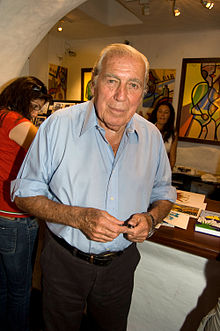Portal:Uruguay
| Portal | Participants | Templates | Tasks | Assessment | Popular Pages | Requests |
The Uruguay Portal
Uruguay (/ˈjʊərəɡwaɪ/ YOOR-ə-gwy, Spanish: [uɾuˈɣwaj] ), officially the Oriental Republic of Uruguay (Spanish: República Oriental del Uruguay), is a country in South America. It shares borders with Argentina to its west and southwest and Brazil to its north and northeast, while bordering the Río de la Plata to the south and the Atlantic Ocean to the southeast. It is part of the Southern Cone region of South America. Uruguay covers an area of approximately 176,215 square kilometres (68,037 sq mi). It has a population of around 3.4 million, of whom nearly 2 million live in the metropolitan area of its capital and largest city, Montevideo. The area that became Uruguay was first inhabited by groups of hunter-gatherers 13,000 years ago. The predominant tribe at the moment of the arrival of Europeans was the Charrúa people. At the same time, there were also other tribes, such as the Guaraní and the Chaná, when the Portuguese first established Colonia do Sacramento in 1680; Uruguay was colonized by Europeans later than its neighboring countries. The Spanish founded Montevideo as a military stronghold in the early 18th century due to competing claims over the region, while Uruguay won its independence between 1811 and 1828, following a four-way struggle between Portugal and Spain, and later Argentina and Brazil. It remained subject to foreign influence and intervention throughout the first half of the 19th century. From the late 19th century to the early 20th century, numerous pioneering economic, labor, and social reforms were implemented, which led to the creation of a highly developed welfare state, which is why the country began to be known as "Switzerland of the Americas". However, a series of economic crises and the fight against far-left urban guerrilla warfare in the late 1960s and early 1970s culminated in the 1973 coup d'état, which established a civic-military dictatorship until 1985. Uruguay is today a democratic constitutional republic, with a president who serves as both head of state and head of government. Uruguay is described as a "full democracy" and is highly ranked in international measurements of government transparency, economic freedom, social progress, income equality, per capita income, innovation, and infrastructure. The country has fully legalized cannabis (the first country in the world to do so), as well as same-sex marriage and abortion. It is a founding member of the United Nations, OAS, and Mercosur. (Full article...) Selected article -Salto (Spanish pronunciation: [ˈsalto]) is the capital city of the Salto Department in northwestern Uruguay. As of the 2011 census it had a population of 104,028 and is the second most populated city in Uruguay, after Montevideo. (Full article...) Selected picture - Detail of the statue to Dionisio Díaz, child hero of the department of Treinta y Tres. Did you know -
CategoriesSelect [►] to view subcategories
People -Carlos Páez Vilaró (1 November 1923 – 24 February 2014) was a Uruguayan abstract artist, painter, potter, sculptor, muralist, writer, composer and constructor. He took an active role in the search for survivors of the 1972 crash of Uruguayan Air Force Flight 571 in the Andes, as his son Carlos Páez Rodríguez was a passenger. (Full article...) General imagesThe following are images from various Uruguay-related articles on Wikipedia.
Related portalsTopicsRecognized content
Featured articlesGood articlesAssociated WikimediaThe following Wikimedia Foundation sister projects provide more on this subject:
Award
Things you can do
Articles that need AttentionDiscover Wikipedia using portals | |||||||||||



























































